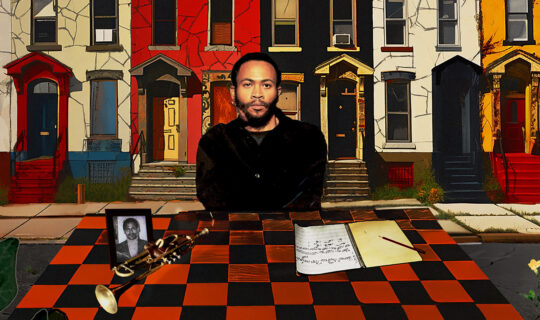November 25, 2012
When Norah Jones was signed to Blue Note Records in 2001, no one at the label knew what direction her music would take. Jones was a little-known 21-year-old lounge singer, born in Brooklyn and raised in Texas, the daughter of Ravi Shankar who had changed her name to make a name for herself. She had been working as a waitress and singing backup vocals for singer-songwriter Victoria Williams while cutting her teeth on the baby grand at The Living Room, the venerable East Village breeding ground that fostered a community of like-minded artists including Madeleine Peyroux, Ron Sexsmith, and Chris Thile. Regardless of her undeniable promise, signing Jones was a risk with a dubious outcome.
Jones’s demo, a collaboration with longtime writing partner Jesse Harris, showcased a sultry blend of jazz and country with a nonchalant pop sensibility that placed her firmly beyond category, not exactly a hyphenate, but still potentially stuck in that nebulous marketing territory where comparisons hold no sway. She had to be presented as merely herself, a natural talent with a wispy voice and seductive charm that straddled genres outside the label’s traditional purview. Alternative in the purest sense, Jones channeled Billie Holiday and Hank Williams through a unique delivery and phrasing entirely her own.
She went on to play out her twenties in the spotlight, but despite international success, nine Grammy Awards, and four platinum-selling albums, Blue Note’s quintessential girl next door still hasn’t lost the frank, unassuming style she had from the start. Jones continues to evolve, refusing to bend to the vicissitudes of commercial demands as she weaves an ongoing coming-of-age narrative played out through her gradually shifting songwriting. Here’s a look back at her artistic evolution, in reverse chronological order.
Little Broken Hearts (2012): Essentially a breakup album, Jones’s most recent release sheds the last vestiges of the innocence of her early career, a thick-skinned confessional that employs hazy distortion and a guitar-heavy backing band to evoke the pain of heartbreak and the ensuing scar tissue. Seeds were planted in 2009, when Jones and producer Brian Burton, better known as Danger Mouse, met in Los Angeles and decided to ignore her past stylistic tendencies and start from scratch. It gestated for two years, and the result is not only a radical departure from the image of breezy chanteuse but arguably her most emotionally naked outing yet.
The album establishes a melancholic ambience with “Good Morning,” an impressionistic ballad of lost love with a diaphanous texture and an almost emo flair, Elliott Smith by way of Kate Bush. On “She’s 22,” a syncopated slow-burner, and “Happy Pills,” a driving, visceral tribute to moving on with life, Jones upends her existential angst to forge a sense of empowerment. Throughout, her jazz background is evident in the phrasing, but she proves her alt-rock bona fides beyond a reasonable doubt.
The Fall (2009): Jones first experimented with darker colors and a stronger pop influence here, working with Kings of Leon producer Jacquire King and veteran sidemen like guitarist Marc Ribot, keyboardist James Poyser, drummer Joey Waronker, and others who molded the album into a moody meditation on identity, loneliness, and independence. Jones really shows her range, from the up-tempo gutbucket stomp of “It’s Gonna Be” to the country-inflected “You’ve Ruined Me,” which is reminiscent of her country side project The Little Willies, to the oft-played single “Chasing Pirates,” an ethereal rumination on a dreamer’s overactive imagination. It all concludes with the droll, cabaret-style tune “Man of the Hour,” a bluesy love note to a four-legged companion, in this case a woman’s best friend.
Not Too Late (2007): Her last prelapsarian album (before The Fall), Not Too Late is a buoyant concoction that leans heavily on Jones’s predilection for country, though top-tier sidemen like organist Larry Goldings, drummer Tony Mason, guitarist Tony Scherr, and Kronos Quartet cellist Jeff Ziegler layer in a consistent genre-bending undertone. The lead single, “Thinking About You,” is a soul-drenched, love-tinged shuffle with a rootsy organ line and a horn section that conjures Lionel Richie.
“Sinkin’ Soon” has a whimsical drawl, with Jones not afraid to let it rip with a growl here and there, parried by a muted trombone. Tunes like “Broken” and the title track fall on the folk-Americana spectrum, elegiac ballads to the lovelorn with a glimmer of hope. Jones took chances on this album, establishing her voice as no mere youthful pop confection with a jazz pedigree, but one of the key chroniclers of post-Generation X malaise.
Feels Like Home (2004): This powder keg of an album features the late Levon Helm on a track, Dolly Parton on another, and drummer Brian Blade on yet another. More than the special guests, though, between “What Am I To You?” and “Sunrise” alone, Jones comes into her own as a songwriter here. Two covers are deftly chosen, with folk icon Townes Van Zandt’s “Be Here To Love Me” showcasing one facet of her persona and album closer “Don’t Miss You At All,” with original lyrics set to Duke Ellington’s “Melancholia,” bringing out her jazz crooner chops. Still, the highlight might be “Creepin’ In,” an electrifying duet with Parton that would get any backwoods hootenanny jumping.
Come Away With Me (2002): Come Away With Me turned Norah Jones into a household name almost instantly, and though it crosses over into soul and pop, it proved that a jazz singer could sell 26 million albums. A decade after its release, “Don’t Know Why” and the title track still get frequent radio play. Jones also fits in a lilting cover of Hank Williams’s “Cold, Cold Heart” and a rendition of “The Nearness of You,” nearly flawless in its beautiful simplicity. Featuring jazz heavy hitters—guitarist Bill Frisell, drummer Kenny Wollesen, keyboardist Sam Yahel, and violinist Jenny Scheinman—Jones set the precedent of using sidemen at the top of the jazz game. For a debut, she made it all feel so effortless, and a lot of people came away wanting to go with her wherever she went.




